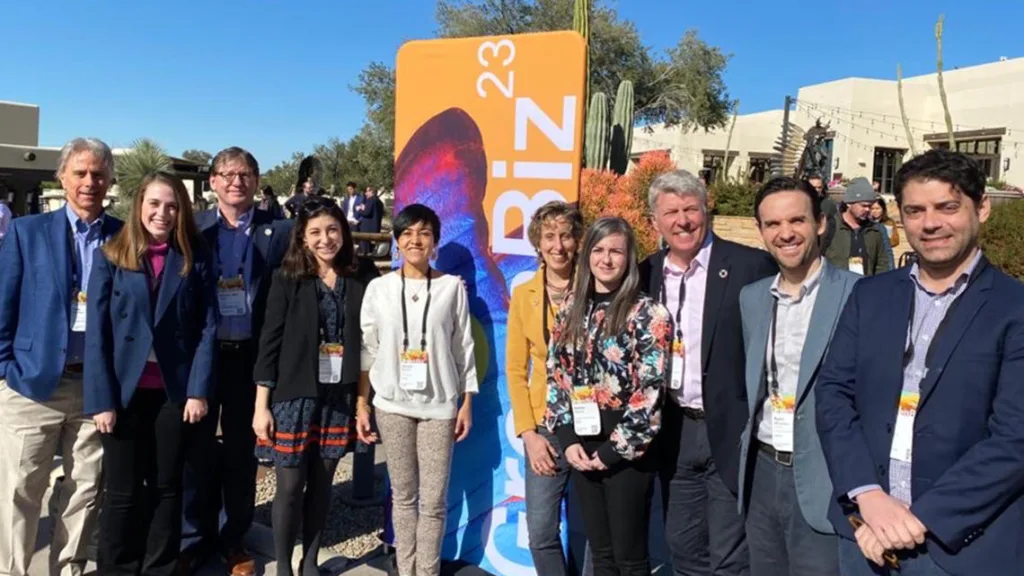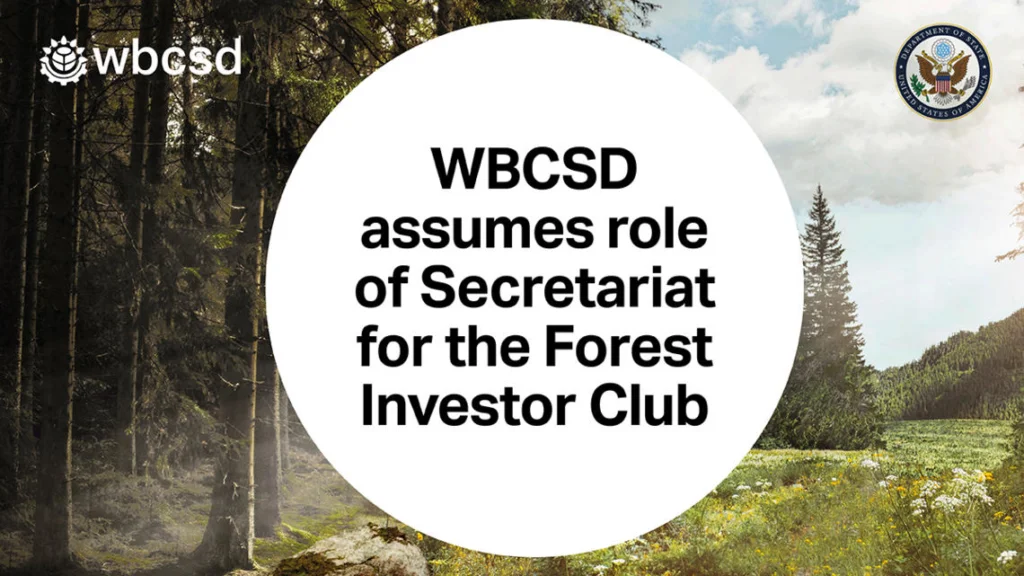Authors
Communications
Last week, over 1,100 sustainability professionals from around the world gathered in Phoenix, Arizona for the tenth annual GreenBiz conference.
The conference focused most notably on sustainable and resilient supply chains; how investors are stepping up their scrutiny of companies’ environmental, social and governance (ESG) data; what it takes to create circular products and business models; and the energy procurement landscape.
The World Business Council for Sustainable Development (WBCSD) leveraged the conference to bring together its North America-based members and partners around a dedicated event on February 5, coupled with a series of sessions hosted as part of GreenBiz. Below are highlights of what was WBCSD’s focus across the four days spent in Phoenix.
WBCSD Member Meeting in North America
Just ahead of GreenBiz opening day, WBCSD held its annual Member Meeting in North America (see agenda), welcoming nearly one hundred individuals from over 50 companies to discuss how “Teams of Rivals” are changing the sustainability landscape. Conversations centered around how corporate collaboration in the precompetitive space facilitates systems transformation.
As forward-looking companies increasingly seek to align their strategies with global frameworks such as the Sustainable Development Goals (SDGs) and the Paris Climate Agreement, WBCSD is mobilizing its members around system-wide programs that will accelerate the transition to a sustainable world.
Through a series of panels and in-depth presentations, the half-day event zoomed in on topics such as trust in business; pre-competitive collaboration among companies in the chemical and the commodity trading sectors; diversity and inclusion; the megatrends and solutions impacting the future of jobs; how risk management is driving the transition to a sustainable financial system; and the circular economy.
During the event, chaired by Chris Walker, Director of WBCSD North America, the Council released new data analysis from the Reporting Exchange, the global resource for corporate sustainability reporting. This new data delves into the sustainability reporting landscape across the United States and Canada, showing that reporting resources and requirements in the US and Canada have become increasingly complex – impacting companies’ abilities to produce decision-useful information. The Reporting Exchange helps companies address that complexity to support better decision-making on sustainability risks and opportunities.
The session on how to accelerate implementation of the circular economy, chaired by WBCSD’s Andrea Brown, also drew a wide range of corporate interest. Onstage, representatives from General Motors, BASF and ExxonMobil discussed the fact that collaboration will be essential for developing scalable circular economy solutions – including the use of secondary plastics, especially in packaging. Panelists discussed success stories, but also spoke of key challenges and the role of technology and market innovation in speeding the transition to a more sustainable world.
Participants were also energized about the Council’s approach to the “Future of Finance” – where Rodney Irwin, Managing Director of WBCSD’s Redefining Value Program and Lois Guthrie, the Program’s Director, discussed the need to improve the financial system by incorporating non-financial information for better decision-making. The key ways to do this, they said, are through reporting, disclosure and better risk management. “We need to move to a world where sustainability is at the board level, it is part of governance and included in the oversight of any organization,” said Irwin.
The final session featured a panel discussion on a new WBCSD initiative on how to align values investing and engage employees through the inclusion of ESG considerations in retirement benefits. The discussion explored how corporate practitioners are developing the tools to align their pension funds with their core sustainability strategy.
Leveraging WBCSD members’ insights around the potential of business to realize the SDGs
On the first day of the official GreenBiz conference, WBCSD ran an in-depth tutorial session on the business implications of the SDGs, highlighting important new developments in this space and showcasing emerging best practice in terms of strategic integration of the SDGs by business.
Filippo Veglio, Managing Director of WBCSD’s People Program, and James Gomme, Director of SDGs, kicked off the session by providing an overview of the SDG landscape, drawing on key messages from WBCSD’s CEO Guide to the SDGs and highlighting research from the Business and Sustainable Development Commission’s Better Business, Better World report. They also provided insight into the latest developments around issues such as: corporate reporting on the SDGs; benchmarking of companies’ SDG performance; growing investor interest in this field; and the connections between the SDGs and the business and human rights agenda.
Jillene Connors from the Earth Security Group then presented key examples of how the SDGs can be used as a framework to enhance understanding of strategic business risks and opportunities, pointing to practical examples in specific sectors and geographies.
The session then incorporated an interactive exchange with a panel of leading WBCSD member companies made up of Claus Stig Pedersen, Head of Corporate Sustainability and Public Affairs, Novozymes; Erin Robert, Executive Director, Sustainable Finance, JPMorgan Chase; Sarah Matheson Mihalecz, Sustainability Lead, North America, Tata Group; and Sophie Beckham, Senior Manager, Natural Capital Stewardship, International Paper. The ensuing dialogue gave attendees the opportunity to hear about some of the challenges WBCSD’s members face as well as the solutions they’re pushing forward.
Finally, Rodney Irwin, Lois Guthrie and Juliette Gaussem, Senior Manager of Guidance and Practice at GRI, led an interactive dialogue around the topic of corporate reporting on the SDGs.
A more detailed overview of the session is available at “What do the SDGs mean for business now?”
Purpose-driven disclosure high on the agenda
Led by Lois Guthrie, the session focused on how corporate reporting can help influence mainstream investors in their resource allocation decisions. She was joined by Prof. Todd Cort from Yale University School of Management, Eric Hespenheide Chairman of GRI Board Directors, and Rodney Irwin.
WBCSD believes that if all environmental, social and governance (ESG) risks are accounted for and outlined in mainstream corporate disclosure documents, investors will be able to make better decisions to reward companies who have accounted for and managed their financial and non-financial risks.
“If we can develop processes and assurance for ESG systems, there will be greater rigor and trust in the information,” Guthrie said. The theory is that better information will lead to better business decision-making in a world where more sustainable companies are recognized and rewarded.
WBCSD continues to drive key developments in this area, and alongside the Committee of Sponsoring Organizations of the Treadway Commission (COSO) leveraged the GreenBiz platform to jointly launch the draft guidance for applying enterprise risk management to ESG-related risks, a groundbreaking development in improving corporate governance. The guide is designed to help organizations worldwide respond to the increasing prevalence and severity of ESG-related risks, ranging from extreme weather events to product safety recalls.
COSO and WBCSD are seeking public comment on the draft until June 30, 2018 in order to ensure that the business and regulatory community are adequately represented in the final version. This unique and ground-breaking work will help companies better understand their risks, so that they can make better business decisions. Having all the information available will eventually help the financial system shift to reward the most sustainable companies, ultimately contributing to better management of the world’s natural and social capital resources.
In addition, WBCSD led discussions on measurement and valuation of both Natural and Social Capital, and replicated the abovementioned Aligning Retirement Assets panel at a well-attended workshop during Greenbiz.
Looking ahead
The need to accelerate the transition towards a sustainable world has never been stronger. This ambitious mission requires business leadership, strong collaboration, and the mainstreaming of ESG information in financial/investment decisions. Together, we can build synergies that will help navigate today’s complex challenges, implement solutions at scale and bring about systemic change.
Overall, the four days in Arizona represented an opportunity for WBCSD to kick off the new year by bringing together sustainability leaders across North America and beyond to delve into the pressing challenges, emerging trends and biggest opportunities in sustainable business today.
Watch this space for regular Insider Perspectives summarizing WBCSD’s efforts to position the business voice in key international platforms focused on the business implications of the sustainability agenda.
WBCSD news articles and insights may be republished in accordance with the Creative Commons Attribution-NonCommercial-NoDerivatives 4.0 International Public License, and in accordance with our Privacy Policy. All Content must be featured with due credits.
Outline
Related
Content

WBCSD at GreenBiz23 Scottsdale, Arizona: February 13-16, 2023
2 March, 2023

U.S. Department of State Commits up to $9 Billion to Restore Forests
21 November, 2022

Are companies really reducing supply chain emissions, or is it all smoke and mirrors?
20 September, 2022
